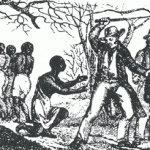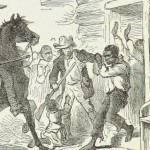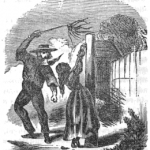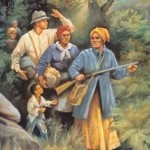Chapter 6
The Powers That Be (Part 1)
Romans 2:5
But because of your stubbornness and your unrepentant heart, you are storing up wrath against yourself for the day of God’s wrath, when his righteous judgment will be revealed.
Thomas Opson was a mean child. Even the dogs shied away from him. When he was only 8 years old, to hear his saintly mama tell it, whenever Thomas came near, the dogs would tuck their tails and run for the safety of the dark underside of the porch. They did this by instinct. When he was 10 and just learning how to snap a well oiled, hard leather whip into submission, the horses and cattle scattered to the sound of its report. They knew better than to wait for the sting of the well-targeted rawhide strap. The poor cats weren’t so lucky. Thomas Opson didn’t like cats. He practiced his whip snapping technique on their ears and their noses. There was always, at least, one old one-eyed cat living down at the stable on the Opson farm. They learned very quickly not to spend too much time at the main house. As they got older, those wiser porch dogs didn’t seem to care much for the biscuit or hard jerky that their 12-year-old master might hold in his hand. They knew it would always be delivered with a swift kick to their ribs. After that, they couldn’t eat it anyway. This was the way the animals and the dogs acted around young Thomas Opson. Even in his early ages, they knew to stay away from him.
The 14-year-old Opson knew that Cardinals mated for life because his mama told him so. It was his reasoning for killing them. He would take the Springfield Flintlock musket that his daddy brought home from the War of 1812 and kill any buff brown Cardinal that came within his sight. He knew the beautiful buff brown birds were the female of the species so he singled them out, by color, and he took their lives. He hunted for them at the first sight of the majestic Red Bird. It was his way. There was no relevant reason for it other than pure evil. His mama told him that she believed the bright red male Cardinal with the black mask and the black throat to be the most beautiful creature on Earth. She was certain that Cardinals were signals of glad tidings that were to be sent from God. Whenever she saw one of them it reminded her to pause in her daily routine and give thanks to the Lord for the blessings in her life.
Thomas Opson thought this was a waste of time and ridiculed his mama for it behind her back. He believed the plain old brown birds to be inferior. They weren’t as worthy of life as the wicked and strangely magnificent Red Bird, the beautiful bird with the black mask and the black throat. Thomas thought the buff brown impostors of real Cardinals should be thinned out. He thought no one would miss them since they weren’t the pretty ones. Not many could even tell they were Cardinals, he reasoned. He rejoiced in watching the solitary male Red Bird suffering for the loss of his mate. Thomas Opson enjoyed having the power over life and death.
He had to hide his Cardinal killings from his mother, of course, and she had no idea why the beautiful birds stopped visiting and stopped bringing God’s glad tidings to the Opson farm.
His mama knew and understood that Thomas was a demon seed. She knew it wasn’t right for children to act this way. All his life she tried to teach him better, but it didn’t take. She still loved her boy. She was his mama, after all. She had hopes that the young man would grow up to be like the Major. Or, at least, her image of the Major.
Anna Opson helped establish the Church of the Lord’s Faith on Shepherd Hollow Road in 1836. This Church became well known in the community for its sweet spirit and its merciful ways. In her whole, young life Anna Opson never lost faith in her God or in her son. She died in 1845 from the fever and whatever little moral restraint that she was able to keep on her boy died along with her.
Even with his mother’s saintly encouragement to do so, Thomas Randolph Opson never cared for the company of another human being. He preferred to be alone. He grew to be a raging bull, a wild boar, and he ran straight towards his desires. If he saw trappings in front of him that he wished to have, he cared little for the concerns or for the safety of those who stood between him and that infatuation.
He never put himself in harm’s way or in any kind of jeopardy. He saved that for those around him. Self-preservation was his loftiest goal. Pity the unfortunate looked down upon souls who found themselves left in the extended company of his malignant spirit. Their chances for future prosperity, sometimes even their chances for present survival, were evilly reduced with each minute they spent with him.
Master Opson was the seed of Major Beauregard Thomas Opson, a merciless military leader who found uncommon favor serving with Old Hickory himself, Andy Jackson. Major Opson was one of General Jackson’s most trusted Officers and served with him during the Creek Wars and all the way through to the final Battle of New Orleans.
It was Major Beauregard T. Opson that oversaw the Court Martial and hostilities against Jackson’s own men in their mutiny of December 1813. The men, volunteers from Tennessee, felt that their one year enlistment periods should be counted from the time that they left their families and their homes in Tennessee. Old Hickory felt that their enlistment times should only be counted from when they were actually in conflict. By the use of summary Court Martial, imprisonment, and even execution by firing squads, Major B. T. Opson whittled those Tennessee volunteer mutineers out of Andy Jackson’s army. By the time new recruits arrived he had trimmed Old Hickory’s branches down to a scant 103 men.
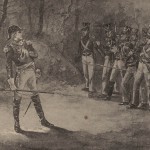 B. T. Opson was like a mule with blinders on. He didn’t think, he just acted. He was stubborn and mean and you could whip him to death before he would move on a position. For that reason, Old Hickory liked him.
B. T. Opson was like a mule with blinders on. He didn’t think, he just acted. He was stubborn and mean and you could whip him to death before he would move on a position. For that reason, Old Hickory liked him.
The old Major took care of his seed, Thomas. He was the apple of his eye. He delighted in the fact that the young Opson could handle a Flintlock Musket. He knew what 50 of those trained muskets could do. He had seen it in the Creek Wars. He thought it was funny that the boy could snap the tail of a dog with his whip. The elder Opson used dogs only for hunting, not companionship. He didn’t, however, like Thomas whipping the cows. He said it made their milk sour.
Thomas Opson had no real friends at school.
“Wrestle Opson, Lewis,” King Gatlin promoted one day in the schoolyard. He and the other school children were amazed at the strength, quickness, and the mobility of the new student, Lewis Wayne. Lewis was the son of new settlers into the County. His daddy was a horse trader and a good one, at that, and a blacksmith, too, from Virginia.
“Come on, Thomas. Stand up to him. Show him what Stewart County is made of. Show him your courage,” they all demanded. Unfortunately, 16-year-old Thomas Opson had no real courage. He was never forced to have it. Instead, he showed them his character.
“All right, I’ll wrestle him,” Opson agreed. Up until that day, Thomas Opson won nearly all of his wrestling challenges at school or in Town. He was champion wrestler of the County picnics by the River. Even the boys that could beat him, wouldn’t.
King Gatlin was one of them. He had beaten Thomas Opson once before at wrestling and he learned his lesson. It didn’t cost him anything that day but a month later, when it came time for Opson to take delivery of a new colt from Gatlin, Thomas declined. He had no room for it, he said. Gatlin had to send the colt to Clarksville to sell it and he lost his profit. King Gatlin knew that beating down Thomas Opson in public would cost you later. He also knew that Lewis Wayne was unaware of this truth. That’s why he requested the Opson/Wayne wrestling match. Gatlin wanted to see Opson beaten and he thought Lewis would be too naive not to do it.
Thomas Opson noticed Jewel Crow standing off to the side of the crowd of students. She was paying close attention to the fair-haired and strikingly handsome Lewis Wayne. Opson moved closer to be by her side, so as to speak with her. He became more than a little jealous and was resentful that she continued to show more interest in the strapping new settler than she did in him. Opson spoke to her, but she only casually listened. He told her that he would better the outsider in no time at all and give him a proper Stewart County welcome. He told Jewel that after the match he would like to speak with her again and again, she only remotely heard what he had to say. Jewel Crow was not impressed with Thomas Opson.
When the wrestling match started the two boys circled one another. Opson seemed to be feigning moves or pretending to dive at his opponent. Lewis Wayne watched Opson, studied him, and didn’t think any of his threats were serious. Opson charged Lewis and grabbed him around the waist and in the privates squeezing very hard in an attempt to pick him up and throw him down. Lewis reached up under both of Thomas’ arms with his own and bent them backward, up behind him as he let his weight settle on Opson. He rode him down hard onto the ground. This all happened in the first minute of fighting. It also happened in a way that Opson’s face was the first thing that hit the ground and when he came up his nose was bloodied and broken. The match was over. The students were speechless. They all knew better than to congratulate Lewis Wayne on a smart victory. Rather, they asked Thomas Opson if he were all right and tended to his spilled blood and his fractured pride. King Gatlin grinned with satisfaction.
Lewis Wayne didn’t seem to care that no one embraced his moment. Jewel Crow had his attention and, as far as he was concerned, Thomas Opson was just another pretend to be wrestler . Jewel and Lewis smiled and talked and moved on with their day as if nothing spectacular had happened. Other than their meeting, nothing had.
Thomas Opson felt different. He allowed that it was just dumb luck the way that they both fell on his head. He wanted a rematch and soon, he claimed. Not today, though because his arms still ached from being bent out of shape and his nose hurt, too.
A week later Opson invited Lewis Wayne over to his farm to talk horse trading. Lewis was intrigued that Thomas’ daddy had served with Old Hickory. He jumped at the chance to have the opportunity to speak with the old Major. The Major was impressed with the young lad’s knowledge of military history. He declared that Lewis understood things about the military that even some of his own junior Officers didn’t know. He told Lewis that he thought he would make a fine military officer if he ever chose to be one. He invited him back to his farm at any time.
Late that night after all had gone to bed, Thomas Opson challenged Lewis Wayne to another test of skill.
“We’ll swim the Cumberland River tonight, Lewis. Then, tomorrow we’ll race our best horses and if we are still tied after all of that we’ll wrestle again to determine who is the better man.”
“Why swim the River at night, Thomas? Isn’t that dangerous?” Lewis knew it had to be.
“It’s not dangerous unless you get caught up in flood stumps or log debris. Those debris piles can drag you down that river forever if you get hung up on them, but we’ll look out for that. Let’s go. You scared?” Opson coaxed.
“I’m not scared, but I’ll have to look it over first, Thomas, before I agree to swim it. As far as horse racing tomorrow goes, I won’t be able to do that. I’m going over to Jewel Crow’s house to meet her family.”
Thomas Opson grit his teeth in disgust under his breath.
Steady rains had fallen in Stewart County for two days and Opson knew that debris would be up in the River because of it. He guided Lewis Wayne to a spot on the bank where the boys all understood that it was the safest, shortest way to cross.
“Now, here is how it works, Lewis,” Opson explained. “This River is no big feat to swim, so long as nothing happens. Don’t let yourself get snake bit, watch out for a tree branch or log debris, and swim for your mark. Pick out a landing spot down the river and hit it. We’ll swim over easy to get a feel for the flow of the current, walk back up, and race back across. I hope you brought your fish flippers.”
“Agreed, Thomas,” the young Wayne acknowledged. “This River is a small challenge. We’ll swim across for a trial run and race back.”
Thomas Opson only smiled.
Stacking their clothing in a clearing under a tree, the boys scanned the river’s surface looking for any piles of floating debris that could be riding in the current and racing in the channel towards them. Full grown cattle had been known to get caught up in that jam of logs, driftwood, and riverbank brush and they had been drowned and drug for miles downstream before being let loose. Swimming the Cumberland River at any time was a dangerous prospect. Swimming it at night was a fool’s endeavor. That’s why these were boys and not yet men. They felt ten feet tall all the time.
Once the boys were satisfied that the river was clear they dove in and swam for the channel. Thomas Opson knew the Cumberland. He made damn sure that nothing lurked between him and the other side of it. Quickly, they were away from the bank and into the current. Lewis knifed naturally through Adam’s Ale with a spirited dive and he came up stroking. Opson was already half a body’s length behind before they ever reached the faster current. Once in the channel, Lewis stroked the water with power and pulled himself mightily against the river. He easily overcame it’s flow and aimed for his mark. Opson fell further behind and it was everything he could do just to stay at Wayne’s feet. He had swum this river a dozen times, but he had never before been asked to swim it this fast. He looked up to see if Wayne was paying attention to what was ahead of him in the River and he was. Opson was discouraged to know that Wayne was looking around and this wasn’t his fastest speed, after all, just a warm up, as he said. They were getting closer to the edge of the channel and Lewis would soon be gliding to the river’s bank. In just a few more strokes, Opson would be too far behind to catch up. The end was within sight and within reach. Thomas gave one last push. It took every bit of strength that he had to catch the efficient, fish flipping feet of Lewis Wayne. He grabbed Wayne’s feet to stop him just as they were out of the channel. It was only then that he felt the power of his strokes. Lewis Wayne pulled Thomas Opson through the water with him for several feet with just his arms and Opson felt as though he were still in the channel. They stopped swimming and began treading water.
“What did you do that for, Opson? This is only a trial run. We weren’t swimming our fastest,” Wayne said. He was hardly out of breath.
“I thought I saw a log jam.” Opson was taking a breath halfway through each sentence.
“I thought I saw a flood stump,” take a breath, “Sticking up out of the water,” take another. “They’ll kill you, boy”. Opson took a deep breath and headed for the bank. He was too tired to be treading water all night.
 “Well, thank you, Opson. I didn’t see it.” Lewis swam effortlessly the remaining fifty feet to the water’s edge.
“Well, thank you, Opson. I didn’t see it.” Lewis swam effortlessly the remaining fifty feet to the water’s edge.
The boys reached the east bank of the Cumberland River and Lewis Wayne sprang easily upon it. Opson followed, struggled up, and sat down on the grass. Laying down or collapsing on it and being out of breath would be too telling of his desperation. “We’ll walk up about a quarter mile and swim back across for real,” Opson offered. “I hope that wasn’t all you’ve got, Wayne.”
“I might surprise you, Thomas,” Lewis Wayne answered.
The only surprise coming that night was from Thomas Opson. As the boys reached the starting point, Opson looked way up the River. He spied a sizable log jam coming down the channel, but it was more than a thousand feet away. If he left now, Lewis Wayne would be across the river and dry by the time that debris pile got here. It was huge, distinct, and easily recognized by a trained eye. It was coming, hard and slow, but it would take a good four to five minutes to get down the river to where they were. Three or four crooked branches could already be seen sticking out of it through the surface of the water and it carried brush debris with it. It was a good one. It was still a very long way away, but Opson knew exactly where it was and exactly how long it would take to get there.
“Look right out there, Wayne,” Thomas coached. “I see nothing right in there coming our way.”
Opson didn’t point a half-mile upstream to the channel-dividing pile of debris that was barreling down the River. It was just outside of the untrained eye’s sight. Lewis Wayne didn’t see it. He didn’t know to look that far back.
“Are you really going to Jewel Crow’s house tomorrow?” Opson distracted Lewis as he hoped for a different answer. “To meet her family? I heard her daddy was a big, strong tree-cutting man. I heard he didn’t like boys coming around to see his daughter. You sure you want to do that?”
“You can rest assured, I am. Jewel said her daddy was a good, hard working man. She said he just acted mean to scare the morons away. Jewel is a smart girl and she comes from a smart family. If she is sweet on me I’d be a fool to look the other way. A man doesn’t want to waste an invitation like that. They don’t come along too often, Thomas.” Lewis Wayne answered, honestly.
“Are you a man, Lewis?” Opson inquired.
“We’ll find that out on the other side of the River, Thomas. You ready?”
Thomas Opson had calculated that the log jam and debris pile was just about within range to sweep any channel swimming boy to a watery grave.
“Let me go up on that rock and look one more time, Wayne, just to be sure that it is clear.” Thomas Opson crawled a few feet up the bank to a vantage point where he could calculate how far away that log jam killer was.
“Just looking, Lewis. A little further. Almost. Hold on. I’m seeing nothing. Are you ready? Now, Wayne!” Opson ran toward the River and tagged Lewis Wayne on the shoulder as he raced by. He dove first and fast into the water.
Lewis Wayne was ready but not for Opson to have a head start. He bolted, dove, and swam and kicked his feet the fastest he had ever kicked in his life to catch up with Opson. He came up out of the water like a dolphin and shot forward like a shark toward the channel. His powerful arm strokes were slicing the water and catapulting him forward. He caught and passed Opson just as they reached the channel. He didn’t notice that Thomas had stopped swimming before going into it. Opson was treading water and backing away from the faster current as Wayne continued to swim like he was five feet behind. Lewis Wayne was neglecting to look at what might lay ahead of him in the River, he was thinking more about winning the race. He made swift headway and Opson thought, for a minute, that this superior swimmer was going to get out of the channel ahead of his death trap. He didn’t make it, though. When Lewis Wayne finally thought to look up the first thing he saw was that mighty debris pile right on top of him. He heard it first. It cut through the River like a loaded, flat bottom boat. The next thing he saw was Thomas Opson one hundred feet back behind him and well out of the channel, watching what was happening. Lewis Wayne made one, last-ditch try to outswim the pile by going straight down river and angling out the side, but it was too late. It was too close to him. A large forward branch snagged his legs and took him, at current speed, sideways down the river. Opson could see Wayne struggling at first against the brush and the branch to break free, but the water against him was too strong. He went under and came back up three times before that log turned and the branch drug him down for the final reckoning. He wanted to scream each of the times he came up, but there was no time for that. Breaths were too precious to be wasted on screams. Lewis Wayne was taking the final breaths of his young life and Thomas Opson was treading water and thinking up a story to tell everyone about why he and Wayne were swimming in the Cumberland River at night.
The story worked. Lewis Wayne’s body was never found and Thomas Opson made sure he was there to console a grieving Jewel Crow. A month later, Lewis Wayne’s mother and father moved their stock and their talents back to Virginia. Their lost son was another victim of the County.
At 17, Thomas Opson began courting Miss Olive Retterree-Smith. She was a Kentucky-bred girl and an accomplished equestrian. Miss Olive was refined and she was a brilliant woman. She finished all of her school books by the age of 12 and began teaching the teacher. After spending four years at boarding school in Lexington, Kentucky Olive was coming to Stewart County to look after her Aunt Naomi Retterree. Miss Retterree was a rich widow woman who was old with the shakes and Olive was tasked by her father to see to her needs. Olive’s parents allowed that when Olive’s mother’s sister passed, Olive would be bestowed with her inheritance. They wished for her to make her Aunt’s last days as peaceful as possible.
Miss Naomi didn’t like or trust Thomas Opson. Something about his eyes, she said. They just didn’t sit right. Naomi thought Miss Olive was a perfectly independent woman with a great chance to make a difference in this world and Miss Naomi didn’t want to see her give that chance up on some scoundrel from Stewart County. She might have the shakes in her old days, but she still remembered how she and her husband had fought like Christians against the lions for everything they owned in this County. She didn’t trust anybody.
Opson was a tall, handsome, dark-haired, slender man with charming eyes. He had money and he had security. That meant a lot in the hard, pioneer life of Stewart County. His land was clean. His trails were easily traveled, his home was inviting, and he kept it that way.
He stayed on his best behavior and swooned Miss Olive for two years. Opson’s daddy died during this time and although Miss Olive was a little leery of some of his moods she thought she saw a little compassion in her beau’s soul at his father’s bereavement. It caused her to hang on a little longer to give him a good chance, but her hope was short lived.
Opson inherited from his father a farm, the stock, and gold and silver, all told, worth about $25,000. It was a tidy sum of money and about equal to what Miss Retterree’s future bequeathal to Miss Olive would be.
But Thomas Opson, being who he was, couldn’t be satisfied with all of that. Even with Miss Olive, in waiting, as his perfect mate for life, he balked and put her off.
Opson took his inheritance and began trading in horseflesh and human flesh and he became very good at buying and selling the both of them. He knew a good horse when he saw it as well as a good slave. He always got what he wanted and he kept the best of both for his own personal pleasure. The horses he kept were high-spirited, the men he bought were strong and healthy, and the women were sometimes mulatto.
Thomas Opson bought an august, noble, distinctively wild black stallion once at the sales. It was a magnificent animal. It was the kind of trophy that Thomas Opson very much liked to own, but it was still, very much, unbroken. It had already thrown him off once and even kicked at him in the stockyards but it was a marvelous specimen and Opson won him against King Gatlin’s bidding for a high dollar price. He had the animal delivered to his home with strict instructions for everyone to stay away from him. He was much too dangerous, Opson warned, for anyone to try to bridle or break without his direction.
When he got home that afternoon he was amazed to see Miss Olive longeing the horse in a large circle. In only a few hours Miss Olive had already begun to gain the horse’s confidence and respect. Opson was decidedly flustered but, at first, he held his tongue.
“We’re sorry, Mr. Thomas,” said Amos Green, as he came running up to Thomas Opson’s horse. Amos was an old stock slave that was originally bought and owned by Mr. Beauregard. “We told her you said for everybody to stay away from that mean horse, just like you said, but she said she could speak to the horse. She went right up to him, Mr. Thomas. It was like nothing you ever seen. We didn’t know what to do. We just backed off. She’s been whispering in that horses ear the likes you ain’t never seen. I ain’t never seen nothing like it.”
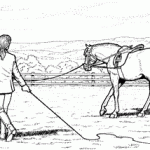 “Get to the barn, Amos.” Opson scowled under his breath.
“Get to the barn, Amos.” Opson scowled under his breath.
“Yes sir, Mr. Thomas,” Amos behaved.
Thomas Opson dismounted his horse and hopped over the fence nearly running to take the longe rope out of Miss Olive’s hands.
“What in the devil’s name are you doing, Olive?” Opson demanded as he jerked the rope from Olive and put himself between the horse and the horsewoman.
The horse immediately bolted and the rope burned out of Opson’s hand. It started bucking and stomping and remembered it’s former attitude. It took four slaves and two healthy nags to settle it back down.
“I was doing fine before you came in here, Thomas. What is wrong with you?” Olive was past understanding.
“This corral is no place for a woman, Olive. You should be back up in that house tending to women’s chores.”
“Should I now?” Miss Olive asked.
Olive walked slowly out of the corral and past the stable up towards the Opson house. She walked as if she had a lot on her mind. She stopped twice along the path and turned back, looking down on the corral. She acted as if she needed to come back and speak again to her gentleman friend but the horse was aggravated and he was occupied. She paused, watching and thinking to herself. Then, she resumed her march up the hill.
A storm was coming in quick from the north and Thomas asked Miss Olive to stay the night. He was sorry for snapping at her, he said. He was just very worried about her. He knew what that horse was capable of and he didn’t even notice that she had taught it to trot. He was very sorry, he almost cried. He was only thinking of her. Like now, he said. He told her that the storm was too severe to be heading down the trail by horse or wagon. He insisted she stay the night. Miss Olive wanted to believe him. She had thought that she saw a glimmer of hope in his soul when his father died. She knew she had left Miss Naomi in good hands with two house women and they would look well after her until she could return. Thomas would send Amos Green out into the storm, he assured, to tell the house ladies that Miss Olive would not be returning until the morrow.
After supper and a taste of liquor, Thomas tried something he had never done before with Miss Olive. He kissed her good night, of course. He had done that many times. But tonight he took it one step further. His amorous advances in the drawing room surprised Miss Olive. She wasn’t raised that way. She almost lost her breath when he attempted to touch her in her secret places.
“Mr. Opson,” she blurted out. “What are you doing? You can’t put your hands on me there! I am a Christian woman. We are not married yet, and I won’t be soiled as a single woman. We have not been properly betrothed. What are you thinking?”
“Miss Olive,” Opson pleaded. We are to be married, aren’t we? It is only a formality now. Will you deny your future husband a simple pleasure?”
“It may be simple to you, Mr. Opson, but it is my dignity and it is all I have. How dare you think that you could trespass upon me like that. And after what I saw of you today, we may not ever get married. Please leave this room, Mr. Opson, or I will be forced to leave this property tonight. The storm has passed and I am not afraid of the dark.” Miss Olive Retterree-Smith was an independent woman.
“I’ll leave.” Opson stomped from the room.
Olive Retterree-Smith readied herself for bed but could not sleep. She tossed in her covers and turned thinking whether, or not, she was making the right decisions about her future. Maybe she should wait a time longer. Maybe her Aunt Naomi was right and Thomas Opson was not the man for her. She decided, after a while, to get back out of her bed and get dressed. She kept thinking of the wild stallion and how tame he was, after all. She wanted to whisper again in his ear tonight. She wanted to calm him like she did earlier. She put on her riding boots and walked back down to the stables.
The horse was tired from the day and barely asleep so she was quiet as she eased up around him. He awoke and remembered her and stayed calm even with her near to him. She whispered in his ear and he slowly unlocked his legs and began to stir about. This was a good horse, she thought to herself. He will make a fine stallion.
She heard some grunting and moaning coming from the other side of the stable and she couldn’t imagine what it was. She left the spirited horse’s side to investigate the sounds that she did not understand.
To her horror, she found her future husband locked in carnal abuse with the young female mulatto house slave that he had only recently purchased. He was grunting like a wild animal as he attacked her from behind and she seemed to moan in both pain and ecstasy, not understanding which her master desired.
“Thomas Opson!” Miss Olive screamed.
“Oh, shat. Shat, shat, shat,” Thomas repeated as Miss Olive retreated back towards the opposite stall.
“What are you doing, Thomas? What are you thinking?” she demanded.
“Olive, Olive wait,” Thomas pleaded as he fell over a bucket. “She means nothing to me. She is just a place for my vitality to play out. I’m a young man, Olive. I tried to approach you earlier, but you scorned me away. You turned me away. I don’t know any different. What was I supposed to do?” Opson begged as he pulled his trousers up.
“What were you supposed to do?” Miss Olive responded. You are supposed to wait. You are not supposed to come down here and have your way with a poor little slave girl. How old is she? 15? How old are you, girl?” Miss Olive was repulsed.
“Almost 15,” the young brown mulatto slave answered.
“I suspected you weren’t the man you let on to be, Thomas Opson. You are so handsome and you act so clean on the outside but on the inside you are rotten to the core. The trails of your farm are well trimmed, but your woods are dirty. Your smile is so beguiling, so deceiving, and a simple girl is easily enticed into your lair. I won’t lower my standards to you, Thomas Opson. I will not live my life with a tyrant such as the likes of you. You are nothing more than a pig.” Olive Retterree-Smith was not realizing that as she so valiantly delivered her truths, like arrows, straight into the heart of Thomas Opson, she had also backed up into the narrow stall with the now agitated stallion. The beast no longer understood that she was still his friend.
Thomas Opson flew into a rage. He charged at Miss Olive, yelling and screaming as he did. She backed even further into the corner of the wild horse’s space and the steed, at once, became one thousand moving pounds of immediate danger. It’s outbursts of fury were amplified and intensified with the howling of Thomas Opson. Opson spit and cussed with a vein-popping eruption that drove the animal further into its panic. He paused to momentarily survey the situation he found himself in and took a deep breath. He seemed to relish the rampage. At that moment, he could have stopped. In that split second, he could have stopped. Instead, he beat on the horse’s head with a whip handle and a bridle bit and waving his arms he spooked the pony up into a frenzy. The fired up stallion began bucking in the stall. It began neighing and whinnying and kicking, breaking, and busting down the boards of its containment.
Miss Olive Retterree-Smith was lost in the bucks and the stomps and the kicks of the wild beast and only after Thomas Opson calmed down and only after the stallion had calmed down did anyone see her lying under the horse with her head stomped in and blood running from her mouth, her eyes, and her ears. She was gone. She had been killed, instantly, and left with a half moon crease the size of a horseshoe in the side of her head.
When he realized that Olive was dead, Thomas Opson immediately pulled his revolver from his holster and fired one shot point blank into the horse’s head, killing it. He was lucky the animal didn’t fall on Miss Olive’s poor body as it slammed to the ground. He called the young mulatto slave over to the stall and asked her to check to be sure that the horse was dead. She did. It was dead and she confirmed it. Opson then put one shot into her heart, ensuring that no witnesses would be left alive to tell the real story.
Slaves came running to the stables after hearing the shots and the lone survivor told the tale. The wild horse became hostile, he reported, just as he said it would. He kicked the lovely Miss Olive in the head, just as he had warned her it might do, and it killed her. In his anger and rage he aimed to shoot the animal dead but it seemed to charge at him and his aim was misdirected and he shot and killed the young slave girl by accident. Finally, he swore, he placed a well-aimed bullet into the animal’s brain.
No one questioned Opson’s account of the accident. The young mulatto slave was buried in the negro cemetery and Miss Olive Retterree-Smith’s body was returned to her home in Kentucky. The horse was fed to the slaves and the pigs.
It was not long after this that Howard Claiborne found favor with Thomas Opson. It was not long after that when Thomas Opson was made Constable of Stewart County.
End of Chapter 6 (Part 1)
RLB4



